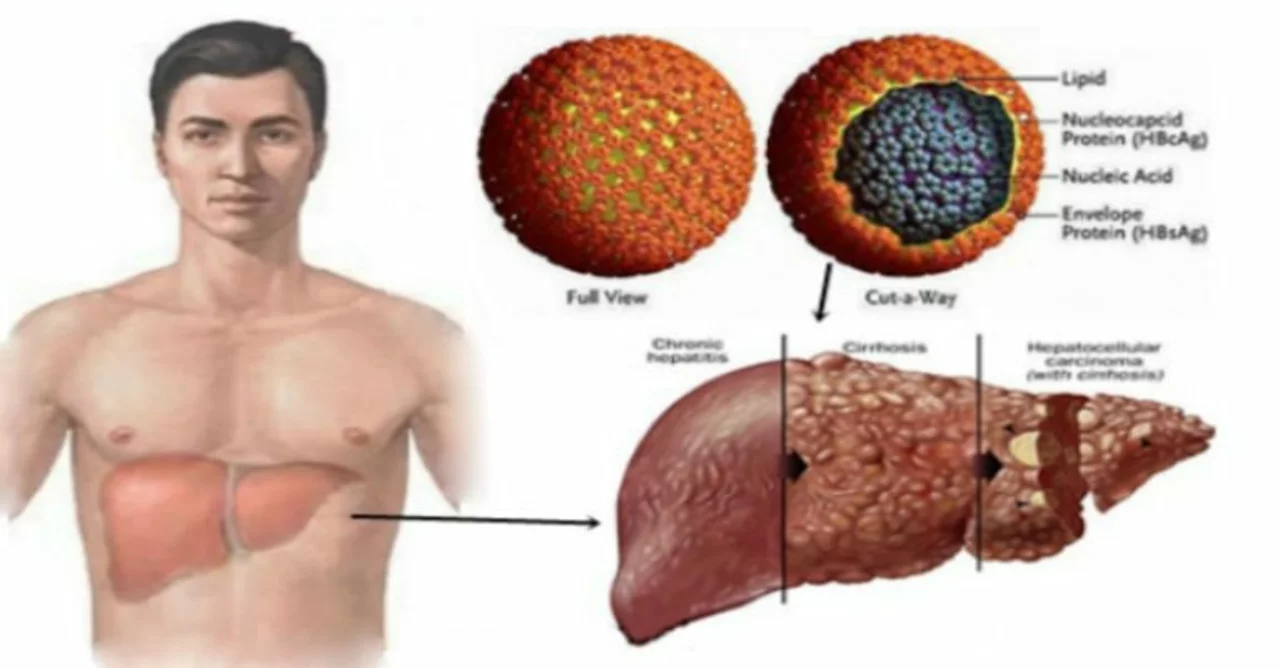
Understanding Chronic Hepatitis B in the Elderly
Chronic Hepatitis B is a viral infection that affects the liver and can lead to serious health complications, especially among the elderly population. As we age, our immune system weakens, which makes it more difficult for our body to fight off infections like Hepatitis B. In this section, we will discuss the basics of Chronic Hepatitis B, its prevalence among the elderly, and the risk factors associated with it.
Hepatitis B is caused by the Hepatitis B virus (HBV) and can be classified into two types: acute and chronic. Acute Hepatitis B is a short-term illness, while chronic Hepatitis B is a long-term condition that can last for several years or even a lifetime. According to the World Health Organization, approximately 257 million people worldwide are living with chronic Hepatitis B, and the elderly population is at a higher risk of developing complications from this infection.
Several factors contribute to the increased risk of Chronic Hepatitis B among the elderly, including weakened immune systems, co-existing medical conditions, and a higher likelihood of being exposed to the virus in the past when preventive measures were less available. By understanding the risk factors and the effects of Chronic Hepatitis B on the elderly, we can better manage and prevent this condition.
Diagnosing Chronic Hepatitis B in the Elderly
Early diagnosis of Chronic Hepatitis B is essential for successful treatment and management, especially in the elderly. However, diagnosing Hepatitis B in older adults can be challenging, as the symptoms may be mild or even absent. In this section, we will discuss the common symptoms of Chronic Hepatitis B, the tests used for diagnosis, and the importance of regular screening for the elderly population.
Chronic Hepatitis B can be asymptomatic, meaning that it may not present any noticeable symptoms. However, when symptoms do occur, they can include fatigue, loss of appetite, nausea, joint pain, and jaundice (yellowing of the skin and eyes). These symptoms can be easily mistaken for other age-related illnesses, which is why it is crucial for older adults to be screened for Hepatitis B regularly.
Diagnosis of Chronic Hepatitis B typically involves blood tests that detect the presence of the virus or its antibodies in the bloodstream. These tests can also determine the severity of the infection and the level of liver damage. If you or a loved one is at risk of Hepatitis B or is experiencing any of the symptoms mentioned above, it is essential to consult a healthcare professional for a comprehensive evaluation and appropriate testing.
Complications of Chronic Hepatitis B in the Elderly
Chronic Hepatitis B can lead to several severe health complications if left untreated, particularly in the elderly population. In this section, we will discuss the potential complications of Chronic Hepatitis B, including liver damage, cirrhosis, liver cancer, and the impact of these conditions on the quality of life for older adults.
One of the primary concerns with Chronic Hepatitis B is the risk of liver damage. The virus can cause inflammation in the liver, leading to scarring (fibrosis) and, ultimately, cirrhosis. Cirrhosis is a severe condition in which the liver tissue is replaced by scar tissue, impairing liver function and increasing the risk of liver failure. Older adults with Chronic Hepatitis B are also at a higher risk of developing hepatocellular carcinoma (liver cancer).
These complications can significantly impact an elderly person's quality of life, as they may lead to a decline in overall health, limitations in daily activities, and the need for ongoing medical care. It is essential to monitor and manage Chronic Hepatitis B in older adults to minimize the risk of these complications and ensure a better quality of life.
Treatment Options for Chronic Hepatitis B in the Elderly
While there is no cure for Chronic Hepatitis B, there are several treatment options available that can help slow the progression of the disease, reduce the risk of complications, and improve the quality of life for older adults. In this section, we will discuss the various treatment options for Chronic Hepatitis B, including antiviral medications, immune modulators, and liver transplantation.
Antiviral medications are the primary treatment option for Chronic Hepatitis B. These drugs work by inhibiting the replication of the virus, reducing the viral load in the body, and minimizing liver damage. Some commonly used antiviral medications for Hepatitis B include entecavir, tenofovir, lamivudine, and adefovir. It is crucial to consult a healthcare professional to determine the most appropriate antiviral medication for your specific situation.
Immune modulators, such as interferon, can also be used to treat Chronic Hepatitis B. These medications help to enhance the body's immune response against the virus, reducing inflammation and liver damage. However, immune modulators may not be suitable for all older adults, as they can cause side effects and may interact with other medications.
In severe cases of liver failure or liver cancer due to Chronic Hepatitis B, a liver transplant may be necessary. This procedure involves replacing the damaged liver with a healthy liver from a donor. While liver transplantation can be life-saving, it is a complex surgery with potential risks and complications, especially for older adults.
Preventing Chronic Hepatitis B in the Elderly
Prevention is key to reducing the risk of Chronic Hepatitis B and its complications in the elderly population. In this section, we will discuss various preventive measures that can be taken, such as vaccination, practicing safe sex, and avoiding exposure to contaminated blood or bodily fluids.
The Hepatitis B vaccine is an effective way to prevent infection with the virus. It is typically administered in three doses over six months and provides long-lasting protection. While vaccination is recommended for all infants, children, and adolescents, it is also crucial for older adults who are at risk of Hepatitis B, such as those with chronic medical conditions, weakened immune systems, or those who may have been exposed to the virus in the past.
Practicing safe sex by using condoms and dental dams can reduce the risk of transmission of Hepatitis B through sexual contact. Additionally, it is essential to avoid sharing needles, razors, toothbrushes, or other personal items that may be contaminated with blood or bodily fluids from an infected person.
By taking these preventive measures and maintaining regular check-ups with a healthcare professional, the risk of Chronic Hepatitis B and its associated complications can be significantly reduced among the elderly population.
Support and Resources for Elderly Patients with Chronic Hepatitis B
Living with Chronic Hepatitis B can be challenging, especially for older adults who may already be dealing with other age-related health concerns. In this section, we will discuss the importance of having a strong support system and the available resources that can provide guidance, assistance, and emotional support for elderly patients with Chronic Hepatitis B and their caregivers.
Having a strong support system in place is crucial for managing Chronic Hepatitis B and maintaining a good quality of life. This can include family, friends, healthcare professionals, and support groups. Support groups, in particular, can be a valuable resource, as they provide a safe space for patients and caregivers to share their experiences, learn from others in similar situations, and receive emotional support.
There are several organizations dedicated to providing information, resources, and support for individuals affected by Hepatitis B. These include the Hepatitis B Foundation, the American Liver Foundation, and the World Hepatitis Alliance. By accessing these resources and engaging with a support network, elderly patients with Chronic Hepatitis B and their caregivers can better navigate the challenges of living with this condition and improve their overall well-being.
5 Comments
Tracy Blake
May 7, 2023 AT 21:43 PM
It's fascinating how the body's immune system becomes a silent collaborator in its own decline. We age, our T-cells grow weary, and suddenly a virus that once danced on the edge of our awareness becomes a tenant in our liver. The irony is poetic: the very system meant to protect us now lacks the stamina to evict an old intruder. We treat symptoms, not the slow unraveling of biological trust. Maybe medicine needs to stop fighting viruses and start rebuilding the soil they grow in. We're not just treating disease-we're grieving the erosion of resilience.
Leo Lee
May 8, 2023 AT 03:11 AM
Stop treating the elderly like fragile porcelain. If you're old enough to have Hep B, you're old enough to get tested and take the meds. No one cares about your 'quality of life' if your liver fails. Get the vaccine if you haven't. Stop being passive. This isn't a spa retreat-it's survival.
Isabel Piaggi
May 8, 2023 AT 17:31 PM
i had no idea the vaccine was still recommended for older adults i thought it was just for babies and kids my mom got it last year after her doctor mentioned it and she said she felt like a kid again getting shots lol i still forget to capitalize and use commas but seriously this info needs to be everywhere
Tom McInnes
May 9, 2023 AT 12:00 PM
A well-structured overview. For those in the UK, the NHS now recommends HBV screening for individuals over 50 with risk factors such as prior blood transfusions or unexplained liver enzyme elevations. Early detection remains the most cost-effective intervention.






Kaitlin Crockett
May 7, 2023 AT 05:47 AM
I never realized how many elderly people are living with undiagnosed Hep B. My grandma had unexplained fatigue for years-turns out she was positive. Screening should be routine after 60.